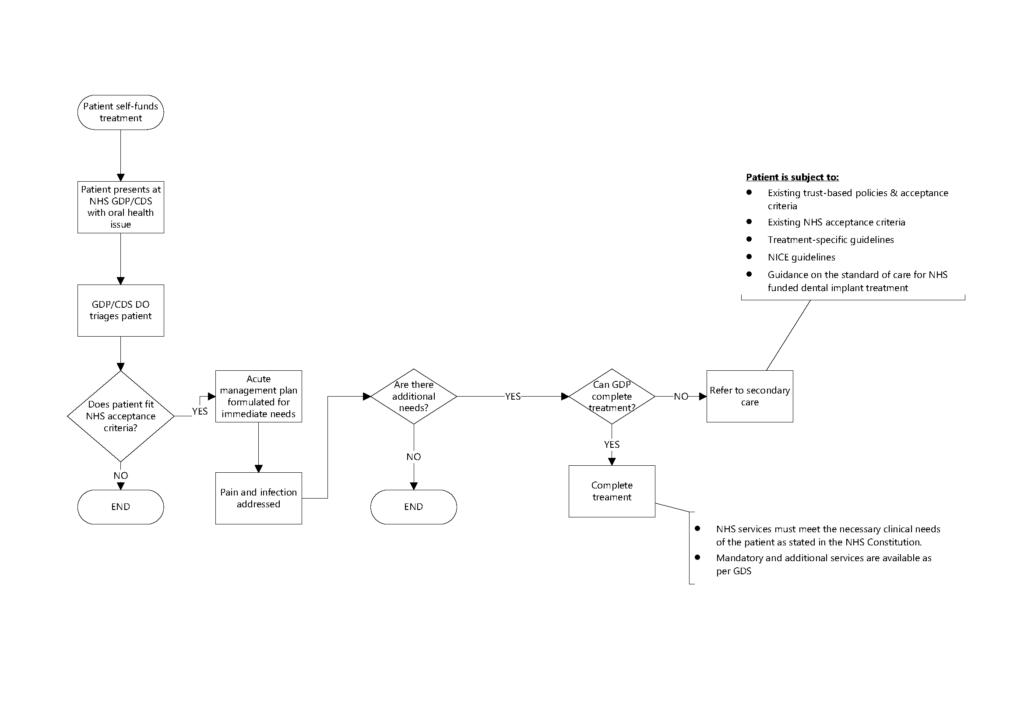Executive summary
This note sets guidelines for when it is appropriate to provide NHS dental care after patients have received self-funded dental treatments, including privately funded non-NHS care within and outside of the UK, in cases where patients have acute presentations or complications.
Patients who have previously paid for dental treatment privately in the UK or abroad but later require NHS treatment due to a complication or sudden oral health issue are entitled to access NHS dental care for assessment and evaluation to stabilise their condition.
Any treatment beyond stabilisation will be assessed based on complexity and need and should be provided at the appropriate care setting, subject to existing NHS acceptance criteria as laid out in The National Health Service (General Dental Services Contracts) Regulations 2005.
Please note that self-funded care that the NHS would not routinely fund would not usually be offered or replaced once stabilisation has been achieved.
Patients who have received self-funded dental treatment (in the UK o or abroad) but later require NHS intervention due to a complication or the presentation of an acute oral health condition should be assessed, and according to presenting complexity, an appropriate course of action should be determined. However, any definitive treatment will be subject to existing NHS acceptance criteria. Where a patient has received their care previously does not impact on their eligibility for NHS care in the future.
Principles
- Based on NHS Constitution: providing appropriate care where needed.
- The NHS will provide the treatment necessary to secure and maintain the patient’s oral health.
- The National Health Service (General Dental Services Contracts) Regulations 2005
Care settings for presentation or referral
It is expected that patients would initially seek support from their self-funded dental care provider, who should be responsible for any post-treatment clinical issues within a reasonable timeframe.
A strategy for caring for these patients is as follows:
1. Patients may present directly to primary or secondary dental or medical care settings, or via 111 urgent assessment and referral. Please refer to the Clinical standard for urgent dental care.
2. Patients are assessed and diagnosed.
3. An acute management plan is formulated to meet the immediate and reasonable oral health needs of the patient, as deemed necessary by the clinician.
4. Pain and infection are addressed, with treatment referred to the appropriate care setting according to local NHS acceptance criteria and care complexity (Level 1, 2 or 3 where required and associated available services) as described within:
- Clinical guide for dentistry
- Clinical standard: oral surgery
- Clinical standard for restorative dentistry
- Clinical standard: paediatric dentistry
- Clinical standard to dental specialties – orthodontics
- Accreditation of performers and providers of level 2 complexity care
5. Urgent care has been addressed and stabilisation of the patient’s health is achieved.
Further and/or reconstructive treatment
Should the patient request/require further reparative or reconstructive elective care, the provision of care and choice of care setting would be subject to NHS acceptance criteria with reference to the complexity of need.
For Level 1 or Level 2 (intermediate) care:
- NHS services must meet the necessary clinical needs of the patient as stated in the NHS Constitution
- both mandatory and additional services are available to provide the treatment necessary to meet the patient’s necessary clinical need in line with general dental services contract
Complex specialist dental treatment
Where a patient requests further complex elective reconstructive treatment not routinely available as part of NHS-funded dental care (for example, advanced multi-unit fixed appliances and/or implants), the patient is subject to:
- existing trust-based policies and acceptance criteria
- existing NHS acceptance criteria
- treatment-specific guidelines
- NICE guidelines
- guidance on the standard of care for NHS funded dental implant treatment
Appendix 1
Relevant publications:
- NHS Constitution
- Clinical standard for urgent dental care
- Clinical guide for dentistry
- Clinical standard: oral surgery
- Clinical standard for restorative dentistry
- Clinical standard: paediatric dentistry
- Clinical standard to dental specialties – orthodontics
- Accreditation of performers and providers of level 2 complexity care
- Avoidance of doubt: Provision of phased treatments.
- General dental services contract
- Guidance on the standard of care for NHS funded dental implant treatment
Appendix 2: Flow chart summarising clinical policy for self-funded dental treatment requiring NHS intervention

Download the flowchart summarising the clinical policy for self-funded dental treatment requiring NHS intervention.
The flow chart shows the following process:
If a patient has self-funded treatment and has presented at a general dental practice (GDP) or community dental service (CDS) with an oral health issue related to that treatment, the GDP or CDS dental officer will triage the patient. The first question is:
Does the patient fit NHS acceptance criteria?
If not, the process ends.
If they do meet NHS acceptance criteria, an acute management plan will meet the patient’s immediate needs. Pain and infection will be addressed.
The second question is:
Does the patient have additional needs?
If not, the process ends.
If there are additional needs, and the GDP can complete treatment, they will complete it. The NHS services provided must meet the necessary clinical needs of the patient, as stated in the NHS Constitution. Mandatory and additional services will be provided in line with the General Dental Services (GDS) contract.
If there are additional needs but the GDP cannot complete treatment, the patient will be referred to secondary care. In secondary care, the patient’s treatment will be subject to: existing trust-based policies and acceptance criteria, existing NHS acceptance criteria, treatment-specific guidelines, NICE guidelines and guidance on the standard of care for NHS-funded dental implant treatment.
Publication reference: PRN00784

